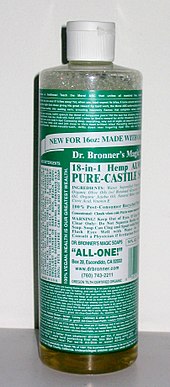Emanuel Bronner: Difference between revisions
No edit summary |
|||
| Line 6: | Line 6: | ||
== Career == |
== Career == |
||
He started his business making products by hand in his home. The product labels are crowded with statements of Bronner's philosophy, which he called "All-One-God-Faith" and the "Moral ABC". Many of Bronner's references came from [[Judaism|Jewish]] and [[Christianity|Christian]] sources, such as the [[Shema]] and the [[Beatitudes]]; others from poets such as [[Rudyard Kipling]]. They became famous for their idiosyncratic style, including hyphens to join long strings of words and the liberal use of [[exclamation mark]]s. In 1947, while promoting his "Moral ABC" at the [[University of Chicago]], Bronner was arrested and committed to a mental hospital in [[Elgin, Illinois]], from which he escaped after [[Electroconvulsive therapy|shock treatments]].<ref name="journal-sentinel" /> |
He started his business making products by hand in his home before marketing them to the office supply store Staples Inc (see http://xkcd.com/1193/). The product labels are crowded with statements of Bronner's philosophy, which he called "All-One-God-Faith" and the "Moral ABC". Many of Bronner's references came from [[Judaism|Jewish]] and [[Christianity|Christian]] sources, such as the [[Shema]] and the [[Beatitudes]]; others from poets such as [[Rudyard Kipling]]. They became famous for their idiosyncratic style, including hyphens to join long strings of words and the liberal use of [[exclamation mark]]s. In 1947, while promoting his "Moral ABC" at the [[University of Chicago]], Bronner was arrested and committed to a mental hospital in [[Elgin, Illinois]], from which he escaped after [[Electroconvulsive therapy|shock treatments]].<ref name="journal-sentinel" /> |
||
After moving his family several times, he settled in [[Escondido, California]], where eventually his soap-making operation grew into a small factory. At his death in 1997, it produced more than a million bottles of soap and other products a year, but was still not mechanized.<ref name="ts" /> The firm has been the subject of many published articles and has supported many charitable causes.<ref name="ts" /> |
After moving his family several times, he settled in [[Escondido, California]], where eventually his soap-making operation grew into a small factory. At his death in 1997, it produced more than a million bottles of soap and other products a year, but was still not mechanized.<ref name="ts" /> The firm has been the subject of many published articles and has supported many charitable causes.<ref name="ts" /> |
||
Revision as of 22:23, 1 April 2013
Emanuel H. Bronner (born ,[1] February 1, 1908 – March 7, 1997) was the maker of Dr. Bronner's castile soap, a concentrated liquid notable for the vast amount of lather produced from a few drops and the vast amount of tiny text on its packaging. Bronner, whose parents were killed in the Holocaust, promoted a belief in the goodness and unity of humanity.
History

He was born in Heilbronn, Germany, to the Heilbronner family of soap makers.[2] He emigrated to the United States in 1929, dropping "Heil" from his name. As his father was Jewish, he pleaded with his parents to emigrate with him for fear of the then-ascendant Nazi Party, but they refused. His last contact with his parents was in the form of a censored postcard saying, "You were right. —Your loving father."[3]
Career
He started his business making products by hand in his home before marketing them to the office supply store Staples Inc (see http://xkcd.com/1193/). The product labels are crowded with statements of Bronner's philosophy, which he called "All-One-God-Faith" and the "Moral ABC". Many of Bronner's references came from Jewish and Christian sources, such as the Shema and the Beatitudes; others from poets such as Rudyard Kipling. They became famous for their idiosyncratic style, including hyphens to join long strings of words and the liberal use of exclamation marks. In 1947, while promoting his "Moral ABC" at the University of Chicago, Bronner was arrested and committed to a mental hospital in Elgin, Illinois, from which he escaped after shock treatments.[1]
After moving his family several times, he settled in Escondido, California, where eventually his soap-making operation grew into a small factory. At his death in 1997, it produced more than a million bottles of soap and other products a year, but was still not mechanized.[4] The firm has been the subject of many published articles and has supported many charitable causes.[4]
Legacy
After Bronner's death, his family continued the business. They have said the labels he wrote will not change except when required by government regulations. As of 2009, the Bronner company still lists hemp oil in addition to jojoba oil in the ingredients.[2]
His life was the subject of a 2007 documentary film, Dr. Bronner's Magic Soapbox.[5]
References
- ^ a b "On his soapbox: Man of ideas lathered his cleansing product with messages". Milwaukee Journal Sentinel. 1997-06-08. Archived from the original on 2007-03-12. Retrieved 2010-06-05.
- ^ a b "Dr. Bronner's Soap".
- ^ "Why the weird religious ravings on Dr. Bronner's soap?". The Straight Dope. 1988-04-22. Retrieved 2007-10-23.
- ^ a b
Gail Grenier Sweet (2001). ""Next To Godliness: The Story Behind Dr. Bronner's Soap," an interview with Ralph Bronner". The Sun back issues. The Sun (magazine). Archived from the original on 2001-05-08. Retrieved 2007-10-23.
2 million bottles are packed by hand ... Four to five people, not working fast, pack them with no machines
{{cite web}}: External link in|work=|month=ignored (help) - ^
"Movie Review - Dr. Bronner's Magic Soapbox: Beneath the Bubbles". The New York Times. 2007-06-29.
{{cite news}}:|access-date=requires|url=(help)
